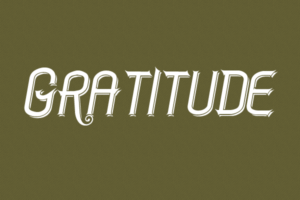 November tends to be a chilly month here in Utah. The warmer Fall days seem to be behind us. It becomes harder to get away with leaving the house without some kind of warmer wear in tow. Most of the leaves have fallen off their branches leaving the trees shivering in the cool air. Snow isn’t far off at this point. It can usually be seen staring down at us from the tops of the mountains that surround us. While we can’t do much to control or change the cold, getting colder weather, we can make this month warmer by working to cultivate and express gratitude.
November tends to be a chilly month here in Utah. The warmer Fall days seem to be behind us. It becomes harder to get away with leaving the house without some kind of warmer wear in tow. Most of the leaves have fallen off their branches leaving the trees shivering in the cool air. Snow isn’t far off at this point. It can usually be seen staring down at us from the tops of the mountains that surround us. While we can’t do much to control or change the cold, getting colder weather, we can make this month warmer by working to cultivate and express gratitude.
Gratitude is a well researched construct and findings indicate that gratitude tends to have a positive impact on us psychologically as well as physically. On the physical health side of things research findings have shown that cultivating gratitude can reduce stress hormones such as cortisol by over 20% (McCraty et. al). More findings note that recalling feelings of appreciation and listing what one is grateful for decreases blood pressure and lowers heart rate variability (McCraty et. al; Shipon et. al). Additional research has found a relationship between gratitude and improved sleep as well as gratitude and more time spent exercising each week (Digdon et. al.; Emmons et. al).
Psychologically, gratitude has been linked to a plethora of positive research findings. More specifically, gratitude has been found to be related to higher self-esteem, lower risks for major depression, improved resiliency, and an increased likelihood of overcoming trauma (Wood et. al.; Hill et. al.). Furthermore, when we experience gratitude it is very difficult to also experience negative emotions such as envy, anger, resentment, and regret at the same time (McCullough et. al.). Therefore, we tend to experience a decrease in these negative emotions. Finally, gratitude has also been found to be related to lower aggression and higher levels of empathy (Dewall et. al).
There are many many ways to experience and express more gratitude, not just this month, but all year long. Below are just a few of the ways. I hope you can find one that you’d be willing to try.
- Keep a gratitude journal. Write about the things you are grateful for. They are likely to be different every day. Don’t worry so much about length. Whether it’s two minutes or 20, as we already discussed above, expressing gratitude is good for you.
- Write a thank you note. Whether you send it or not, the act of writing a thank you note is likely to create positive emotions that last. Think of people who have done something kind for you, big or small, and take a minute to express thanks. As a side note, taking a minute to verbally express genuine thanks in person is also a great way to experience gratitude.
- Dinner table gratitude. Bring your family in on the action! With your family gathered around the dinner (or breakfast or lunch) table take turns to verbally express what you are grateful for. Do this few times a week. Notice the variability in the responses. Warm, happy feelings for all!
- 30 Days of Gratitude. Click on this link for the 30 days of gratitude topic list: http://textmyjournal.com/gratitude-journal-prompts/ With a different prompt each day, 30 Days of Gratitude makes it easy to experience more gratitude in your life.
Sources:
Dewall, Lambert, Pond, Kashdan, & Fincham. A grateful heart is a nonviolent heart: Cross-sectional, experience sampling, longitudinal, and experimental evidene. Social Psychological and Personality Science (2012): 232-40.
Digdon & Koble. Effects of constructive worry, imagery distraction, and gratitude interventions on sleep quality: A pilot trial. Applied Psychology: Health and Well-Being: 193-206.
Emmons & McCullough. Counting blessings versus burdens: An experimental investigation of gratitude and subjective well-being in daily life. Journal of Personality and Social Psychology: 377-89.
Hill, Allemand, & Roberts. Examining the pathways between gratitude and self-rated physical health across adulthood. Personality and Individual Differences: 92-96.
Lyubomirsky. The how of happiness: A scientific approach to getting the life you want. (2008): 89-101.
McCraty, Barrios-Choplin, Rozman, Atkinson, & Watkins. The impact of a new emotional self-management program on stress, emotions, heart rate variability, DHEA and cortisol. Integrative Physiological and Behavioral Science: 151-70.
McCraty. The effects of emtions on short-term power spectrum analysis of heart rate variability. The Amerian Journal of Cardiology: 1089-093.
McCullough, Emmons, and Tsang. The grateful disposition: A conceptual and empirical topography. Journal of Personality and Social Psychology: 112-27.
Shipon. Gratitude: Effect on perspectives and blood pressure of inner-city African-American hypertensive patients. Dissertation Abstracts International: Section B: The Sciences and Engineering 68 (2007).
Wood, Froh, & Geraghty. Gratitude and well-being: A review and theoretical integration. Clinical Psycohology Review: 890-905.